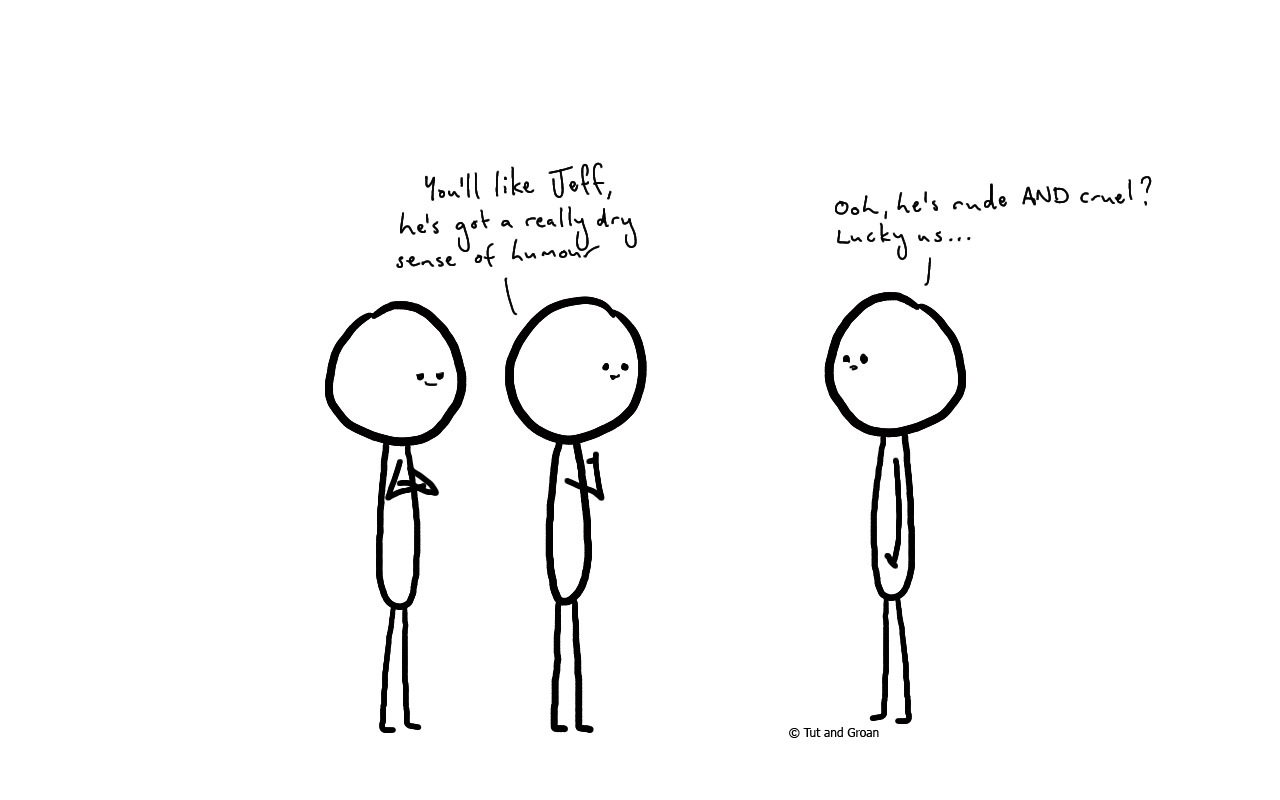What is dry sense of humour? This question often intrigues both comedy enthusiasts and casual observers alike. With its roots deeply embedded in cultural nuances, dry humour can be a bit challenging to define due to its subtlety and understated delivery. In this article, we will delve into the intricacies of dry sense of humour, exploring its characteristics, examples, and its significance in communication.
Dry sense of humour often relies on a straight-faced delivery, where jokes or witty remarks are made without any indication that something humorous is being said. This type of humour can be found in various forms of media, including television shows, movies, and literature, often leaving the audience questioning whether they should laugh or not. Understanding dry humour can enrich our appreciation for comedy and enhance our communication skills.
In the following sections, we will dissect the elements that make up dry sense of humour, its historical background, and how it varies across cultures. We will also provide practical examples to illustrate this unique form of wit and how it can be effectively used in everyday conversations.
Table of Contents
- Definition of Dry Sense of Humour
- Characteristics of Dry Humour
- Famous Examples of Dry Humour
- Cultural Variations in Dry Humour
- Importance of Dry Humour in Communication
- Psychological Effects of Dry Humour
- How to Use Dry Humour Effectively
- Conclusion
Definition of Dry Sense of Humour
Dry sense of humour is characterized by a lack of overt emotional expression and a straightforward delivery of jokes, often making the humour feel more profound and sophisticated. It typically involves saying something humorous in a serious or matter-of-fact tone, which can make the punchline even more impactful.
Key Features of Dry Humour
- Subtlety: The humour is often understated.
- Irony: Many dry jokes involve a degree of irony, where the opposite of what is expected occurs.
- Deadpan Delivery: The speaker maintains a straight face, which adds to the joke's effectiveness.
- Context-Dependence: The humour often relies heavily on context for its impact.
Characteristics of Dry Humour
Several characteristics distinguish dry sense of humour from other forms of comedy. Understanding these can help you identify dry humour when you encounter it.
1. Lack of Exaggeration
Unlike slapstick or other exaggerated forms of comedy, dry humour usually avoids hyperbole. The jokes might be based on real-life situations that go unnoticed or unappreciated.
2. Serious Tone
The serious tone used in delivering dry humour adds to its charm. This contrast between the content of the joke and the manner of its delivery often creates a delightful surprise for the audience.
Famous Examples of Dry Humour
Numerous comedians and actors are renowned for their dry sense of humour. Here are a few notable examples:
- Ricky Gervais: Known for his deadpan delivery and sharp wit, Gervais often uses dry humour to address controversial topics.
- Bjork: The Icelandic singer often employs dry humour in her interviews, leaving fans amused and perplexed.
- David Mitchell: This British comedian is famous for his dry observations on everyday life.
Cultural Variations in Dry Humour
Dry sense of humour varies significantly across cultures. What is considered funny in one culture may not translate well to another. Here’s how dry humour is perceived globally:
1. British Humour
British humour is often cited as the epitome of dry wit. Shows like "The Office" and "Monty Python" exemplify how dryness is integrated into comedic narratives.
2. American Dry Humour
While American humour can be more overt, shows like "The Office" (U.S. version) and "Parks and Recreation" showcase a blend of dry humour in a more familiar format.
Importance of Dry Humour in Communication
Incorporating dry humour into conversations can offer several benefits:
- Enhances Relatability: Using dry humour can make discussions more engaging and relatable.
- Encourages Critical Thinking: Dry jokes often require the audience to think critically, promoting deeper conversations.
- Reduces Tension: A well-placed dry joke can lighten the mood in tense situations.
Psychological Effects of Dry Humour
Research suggests that dry humour can have positive psychological effects:
- It can foster social bonds by creating shared experiences of laughter.
- Dry humour often encourages a deeper understanding of complex issues.
- It can serve as a coping mechanism, allowing individuals to navigate difficult situations with grace.
How to Use Dry Humour Effectively
To effectively incorporate dry humour into your communication, consider the following tips:
- Know Your Audience: Ensure your audience appreciates dry humour to avoid confusion.
- Timing is Key: Deliver your jokes at the right moment for maximum impact.
- Keep It Subtle: Aim for understated remarks that require some thought.
Conclusion
In summary, dry sense of humour is a unique and sophisticated form of comedy that relies on subtlety and irony. It can enrich conversations, foster connections, and provide a fresh perspective on everyday life. Whether you are a fan of dry humour or looking to incorporate it into your communication style, understanding its nuances can greatly enhance your appreciation for this subtle art form.
If you enjoyed this article or have experiences with dry humour to share, feel free to leave a comment below or share this article with friends who might appreciate a good wit!
Thank you for reading, and we hope to see you again for more intriguing insights into the world of comedy and communication!




